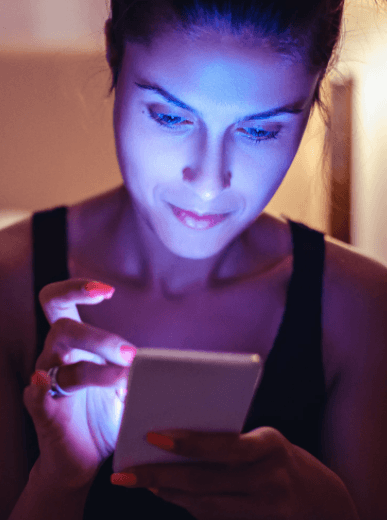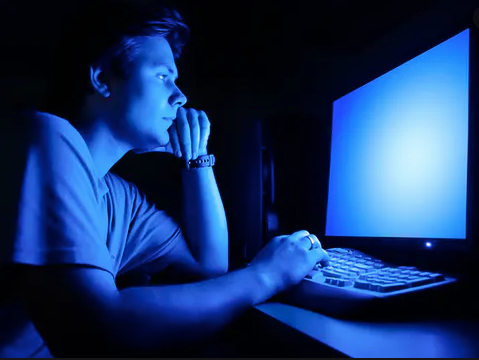
How Blue light is affecting your sleep

It’s a bit of an understatement to say that the last year has been a bit stressful and more than ever, a good kip is hard to come by. On average, adults are supposed to have between six and nine hours of sleep a night, and there are heaps of studies that show how not getting your eight hours a night can affect your physical and mental health.
We all know that getting an early night is the best way to feel fresh in the morning. It’s especially good if you’ve got an early start, or if you just fancy turning over a new leaf and picking up healthy habits!
There are a few things that can hinder your forty winks, from stress to diet and exercise. As technology’s advanced, however, there’s a more modern problem that negatively affects your sleep health. You’ve probably already heard about blue light, and it can be difficult to separate the “if you sit close to the TV you’ll get square eyes” old wives tales from science.
Luckily for sleep enthusiasts, March is officially national bed month! The sleep council dedicates the whole of the month to teaching about how important sleep is to a healthy lifestyle. So, in the spirit of the sleepiest season, we’ll discuss blue light and how it’s affecting your sleep.
What even is Blue Light?
Exactly what is Blue Light? Well, the bad news is that it’s very technical and a bit complicated to get into. The good news is that we’ve broken it down to the essentials. The light we get from the sun is made up of a broad spectrum of different colours of light, usually known as “white light” and Blue Light is a part of that spectrum.
Before the advent of technology, we mostly relied on the light of the sun (not great for cloudier parts of Scotland) and spent most of the evenings in the dark. In fact, our ancestors developed their sleep rhythms naturally following the sun the way many animals do; it’s why birds wake us up at four in the morning throughout the summer!
Nowadays we’ve got brilliant inventions like electricity, so we don’t have to worry about hurrying off to bed as soon as it gets dark outside. Even better, we spend our evenings after work catching up on our favourite shows, gaming or scrolling through social media for way longer than advised. This might seem all fine and dandy, but all of this exposure can be an issue for sleep.
Why is it bad for my sleep rhythm
So you’re probably wondering “well that doesn’t sound too bad” and you’re right! Blue light in itself is actually beneficial during the day for our health! It boosts our attention spans, quickens our reaction times and can even improve our mood. Like with most good things, however, too much can be a problem. It can disrupt normal sleep patterns and might even contribute to illnesses like heart disease, obesity and cancer.
We get lots of blue light from artificial light, and there’s no worse offender than our screens. Now, don’t throw away your laptops and renounce technology forever, as it seems the worst time to be on your phone is around bedtime.
Blue light can firstly cause eye strain since squinting at a bright screen in the dark when you scroll through your phone can cause damage to your eyes. In terms of sleep, any blue light hinders your body from producing melatonin, a natural hormone the brain uses to send you off to sleep.
In fact, a Harvard study showed that blue light decreased the rate of melatonin production in the brain for twice as long as other light spectrum colours, and shifted circadian rhythms by up to three hours.
So how do I avoid it?
When it comes to avoiding light around bedtime, the most definitive way is to give up modern lighting and go to bed as soon as the sun sets, but we know that’s less than ideal. The easiest way to stop your circadian rhythm from being knocked out of whack is to avoid looking at your phone for at least an hour before bed.
If you use an iPhone you can also turn on your night shift function on your settings that automatically changes your screen light to the warmer end of the colour spectrum. Of course, if you’re on the actual night shift and work with screens blue light is a big issue.
However, you even buy special blue light glasses that block blue light and help your sleep! They even help to prevent the eye strain and headaches blue light is often responsible for, so they’re an excellent investment if you work with computers often.
Well, what do I do before bed if I can’t watch Netflix?!
Catching up on favourite shows that we’ve missed throughout the day is a great way to spend the evening, but once it’s getting to around bedtime it’s much better to ignore the call of the next episode button. Instead, try and adopt a bedtime routine that doesn’t involve screens.
There are lots of activities that are much better for a healthy sleep routine than perusing Twitter. Studies show that interacting with plants before bed can calm the mind, and plants can make for a calming environment perfect for sleep.
Organising a to-do list for the next day and clearing away any clutter that’s popped up throughout the day can be very beneficial for mental health and improves sleep. You can also try meditation, or run a warm bath to wind down at the end of the day.
The key to a healthy bedtime routine is to essentially incorporate calming activities and forgo activities involving screens and technology, so it’s really up to you!
What else can I do?
Blue light and managing our exposure to it is important for maintaining a healthy sleep schedule, but there’s nothing that beats a great mattress for a perfect sleep. So, to celebrate bed month, we’re offering you a cool 30% off when you purchase a bed and mattress.
